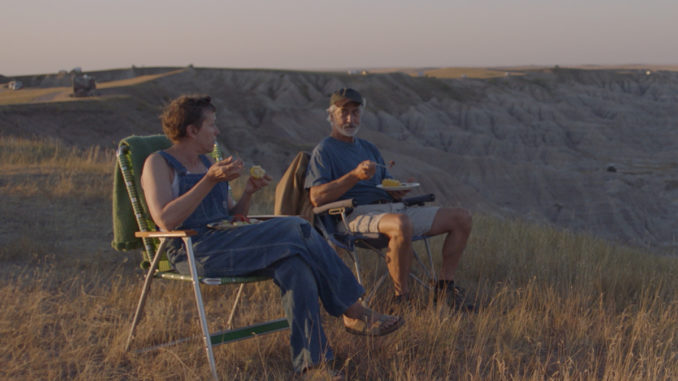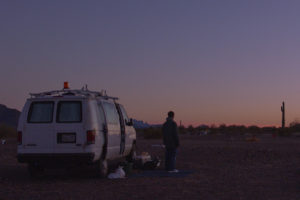
Chloé Zhao’s “Nomadland,” an adaptation of Jessica Bruder’s 2017 novel, was released Feb. 19 on Hulu to both critical and popular acclaim. As it stands, the film has received six Oscar nominations, including Best Motion Picture, Best Directing and Best Adapted Screenplay. The piece is undoubtedly worthy of its praises and potential accolades, for Zhao has crafted a film that explores the sacrifice and the sanctity of America’s nomads with grace and respect.
“Nomadland” follows Fern, a reserved but resilient woman who, after losing everything in the Great Recession of 2008, takes on the moment-to-moment lifestyle of a modern-day nomad. She travels cross-country in a van, appropriately dubbed Vanguard, living day to day among other nomads. Fern jumps from job to job: an Amazon packer one day, truck stop cashier the next, sleeping at gas stations and commuter lots. Meals are prepared with a portable stove; waste is disposed of in a five-gallon bucket. She spends her days wandering through nomad camps in the desert heat and her nights under mounds of blankets to fend off the desert cold.
All of this is permeated by a shadow of sadness, a sense of regret and, most significantly, a privation of living. While Fern manages to find joy in the smaller moments of her nomadic lifestyle, the viewer is painfully aware of her struggle to cope with the present and, ultimately, the past. Her longing for her old life is almost tangible, her frustration over her husband’s death felt. “Nomadland,” quite appropriately, pushes a message of moving on while not forgetting those you’ve left behind.

Zhao approaches the film’s subject matter observationally, without a critical eye. She has no intention of passing judgment. Instead, she aims to showcase those who, like Fern, have been forced into the restless motion of a bereft vagabond and, likewise, those who choose the life of a nomad willingly. Through Fern’s eyes, we witness both objective acknowledgment and caring celebration in the people she meets on the road, all while dealing with her own demons. It is a spectacle to behold.
This spectacle is best realized by the film’s director of photography, Joshua James Richards. The sprawling vistas of the American West have never looked better — the Nevadan snowfields a painterly white, the Rocky Mountains on the horizon a crisp blue, brooding in shadow. The less grand locales are similarly brought to life by Richards’s keen cinematography. Decrepit parking lots and campsite restrooms festering with moths adopt a sullenness that speaks to his ability to show these places for what they are — no shying from the truth, however dismal.
Likewise, the performances in “Nomadland” are exemplary. Frances McDormand embodies Fern’s role with a veteran’s prowess, enlivening the character with the reservation and resilience required of her. McDormand’s execution seems effortless, reflecting her ability to perform seamlessly and operate within a character’s reality. It’s hard to picture anyone else in the role.
The film’s ensemble is also impressive. They manage to compose a cast of equally seamless characters, to the point that the film often feels like a documentary about real people, a sensation Zhao no doubt desired to elicit. To this point, many of these characters are indeed played by their real-life nomad counterparts, only adding to this seamlessness.
Ultimately, “Nomadland” is a film about both loss and finding — familiar feelings, but director Zhao and a cast of fully realized characters bring enough nuance to the table to make them fresh. It is a respectful look at the lives of America’s nomads, whether by choice or by circumstance, and is a worthy contender for some of the film industry’s highest awards.
